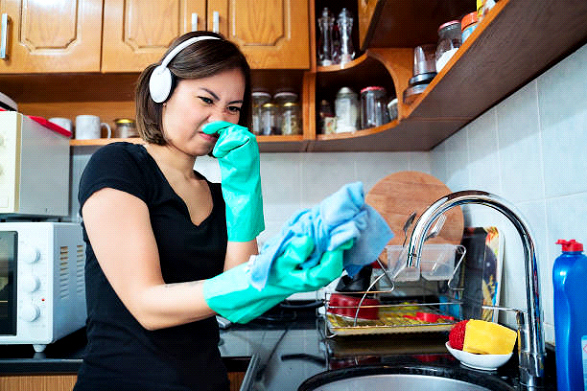We all want to add a fresh, clean scent to our kitchen. Especially because it is the place where we prepare all the food. Nothing is more disgusting than the terrifying smell of the sink!
A lot of things can get stuck in the siphon of the kitchen or bathroom sink, and as they start to break down, the drain can give off a terrible rotten egg smell. The unpleasant odor coming out of the drain can be more than just a foul odor.
Even if your best kitchen sink smells like sewage, it’s likely the smell of sulfur from the sink pipe that occupies your nostrils.
The kitchen is the heart of the home, a place where we prepare our meals and gather with loved ones. However, a foul odor emanating from the kitchen sink can quickly turn this haven into a nightmare. If your kitchen sink smells like rotten eggs, don’t worry. This guide will help you understand why this happens and how to fix it.
Contents
Understanding the Cause of the Smell-Like Rotten Eggs
The rotten egg smell is often due to two primary reasons:
- Food and dirt accumulation: Anything other than water that goes down the sink can stick to the pipe’s sides or get clogged. Over time, bacteria decompose these substances, resulting in a foul odor.
- Sewer gas: If the U-bend (a pipe beneath the sink) lacks water due to leaks or evaporation, sewer gas can rise into the pipe.
Ways To Get Rid Of Rotten Egg Smell In Sink
Below is a list of different methods you can use to remove unpleasant odors from your kitchen drain.
Try one of these cleaning methods to get rid of the smell of rotten eggs in the kitchen. For sewage gas odors, follow the instructions and check the U-bend.
1. Baking Soda And Vinegar
- Pour 1/2 cup of baking soda into the drain.
- Follow it with one cup of vinegar.
- Allow the solution to foam for a few hours.
- Flush the drain with boiling water.
Baking soda and vinegar are household staples that work wonders in eliminating odors. Baking soda, or sodium bicarbonate, neutralizes both acidic and basic odor molecules, while vinegar, an acetic acid, breaks down organic molecules, including odor molecules. The foaming action you see is the reaction of acetic acid with sodium bicarbonate, forming carbonic acid, which quickly decomposes into carbon dioxide and water. This reaction helps to stop any stinky decay in the sink, and the boiling water ensures everything is flushed away.
2. White Vinegar
- Pour a small quantity of white vinegar down the plughole.
- Set aside for 30 minutes.
- Rinse thoroughly with warm water.
3. Check the U-bend
The U-bend pipe, also known as a sewage gas trap, should always be filled with water to prevent sewage gas from escaping the drain. If you notice a persistent bad odor, check the U-bend for the following:
- Evaporation: If you haven’t used the sink for a while, the water in the U-bend might have evaporated. Simply flushing the drain can solve this issue.
- Leaks: Look for drips or damp areas under the sink. If there’s a leak, you’ll need to contact a professional plumber for repair.
- Blockages: If the odor persists after cleaning, you may need to remove the U-bend with a wrench and clean it with a wire brush.
Preventing Future Odors
Prevention is always better than cure. Here are some tips to prevent future odors:
- Use a drain strainer to prevent food particles from going down the pipe.
- Never pour grease or fat down the drain. Instead, use a kitchen towel to soak up or scrape off fat before washing your pans.
- Pour leftover boiling water down the drain to kill bacteria.
- Regularly pour baking soda into the drain, especially if you’re away for a while.
- Schedule regular service checks with a professional plumber to keep your pipes clean.
Conclusion
While there are several temporary solutions to eliminate the rotten egg smell from your kitchen sink, such as using a natural enzyme cleaner or vinegar and baking soda, persistent issues like clogged or leaking drains may require the expertise of a professional plumber. Remember, a clean and odor-free kitchen is a happy kitchen!
